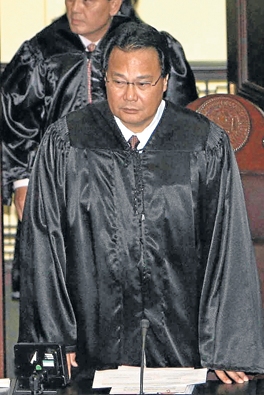In The Know: The path of impeachment

UNDER HEAVY FIRE “I assure you I do not intend to leave and do as they please,” says Chief Justice Renato C. Corona LYN RILLON
Under the Constitution, the House of Representatives has the exclusive power to initiate cases of impeachment against the President, Vice President, members of the Supreme Court and constitutional commissions, and the Ombudsman.
The Senate, on the other hand, has the sole power to try and decide all cases of impeachment.
Impeachable offenses include culpable violation of the Constitution, treason, bribery, graft and corruption, other high crimes or betrayal of public trust.
Path of impeachment
A verified complaint is filed in the House by any member, or any citizen upon endorsement by any member, or a resolution filed by at least one third of all members. It is then referred to the justice committee, which determines if it is sufficient in form and substance.
The committee, after hearing, and by a majority vote of all its members, submits its report and recommends resolution to the House. In case the verified complaint or resolution of impeachment is filed by at least one-third of all the members of the House, it will constitute the articles of impeachment, and trial by the Senate proceeds.
At least one-third of all the members of the House must vote to approve the articles of impeachment.
The Senate sits as a court to hear charges. When the President is on trial, the Chief Justice of the Supreme Court presides but does not vote. On the other hand, the Senate President presides in the impeachment of the Vice President, members of the Supreme Court and other officials.
The House of Representatives acts as the sole prosecutor at Senate trial through a committee of eleven members.
A two-thirds vote of the senators is needed to convict.
What Went Before: Impeachment cases
Then President Joseph Estrada became the highest Philippine official to be impeached by the House of Representatives and tried by the Senate.
In October 2000, he was accused of accepting bribes, engaging in graft and corrupt acts, knowingly violating the Constitution and betraying public trust.
On Nov. 13, 2000, then Speaker Manuel Villar moved to impeach Estrada. No vote was held by the full House on an impeachment declaration. Villar explained that it was unnecessary because 77 of the 218-member House signed the impeachment complaint, or more than the 73 signatures needed.
But on Jan. 16, 2001, a majority of the senators voted not to open supposed key evidence on Estrada’s alleged P3.3-billion secret bank account. This brought the impeachment trial to an abrupt end and led to Edsa II, which toppled Estrada and installed then Vice President
Gloria Macapagal-Arroyo to the presidency.
On Sept. 12, 2007, the Sandiganbayan found Estrada guilty of plunder, but he was pardoned by Arroyo a month later.
Other officials faced impeachment complaints.
On Oct. 22, 2003, the House dismissed an impeachment complaint filed by Estrada against Chief Justice Hilario Davide and seven other Supreme Court justices for purportedly conspiring and participating in Edsa II.
On Oct. 23, congressmen allied with businessman Eduardo “Danding” Cojuangco signed a second impeachment complaint against Davide, this time for alleged irregularities in the disbursement of the Judiciary Development Fund.
On Nov. 10, 2003, the Supreme Court voted 13-0 that the complaint was “unconstitutional.” Davide retired in December 2005.
Several complaints were also filed against then President Gloria Macapagal-Arroyo in the wake of the “Hello Garci” election fraud scandal. But the House dismissed all complaints that accused her of rigging the 2004 polls, involvement in corruption and condoning human rights violations.
In March, the House of Representatives, by a vote of 210-47, impeached then Ombudsman Merceditas Gutierrez for allegedly sitting on complaints against public officials. She resigned before her trial began. Lawrence de Guzman, Inquirer Research
Sources: Inquirer Archives; Senate Resolution Adopting the Rules of Procedure on Impeachment Trials; 15th Congress Rules of Procedure in Impeachment Proceedings














